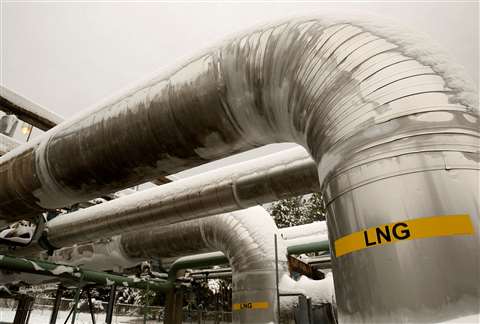U.S., EU seek ways to lessen Europe’s dependence on Russian gas
March 25, 2022
Task Force will work to diversify supply, reduce demand
The U.S. will send more liquefied natural gas (LNG) to Europe to help end its dependence on Russia.
The LNG support was outlined by U.S. President Joe Biden and European Commission President Ursula von der Leyen when they announced a joint Task Force to reduce strengthen European energy security as Russia’s attack against Ukraine continues.
The Task Force for Energy Security will be chaired by a representative from the White House and a representative of the President of the European Commission. It will work to ensure energy security for Ukraine and the EU in preparation for next winter and the following one while supporting the EU’s goal to end its dependence on Russian fossil fuels.
The Task Force will organize its efforts around two primary goals: (1) Diversifying liquefied natural gas (LNG) supplies in alignment with climate objectives; (2) Reducing demand for natural gas.
Diversifying LNG Supplies in Alignment with Climate Objectives
The United States will work with international partners and strive to ensure additional LNG volumes for the EU market of at least 15 bcm in 2022, with expected increases going forward.
The United States and the European Commission will undertake efforts to reduce the greenhouse gas intensity of all new LNG infrastructure and associated pipelines, including using clean energy to power onsite operations, reducing methane leakage, and building clean and renewable hydrogen-ready infrastructure.
 U.S. and European leaders announced a task force on helping to cut the EU’s heavy reliance on Russian fossil fuels. The broad outline calls for U.S. work with “international partners” to find another 15 billion cubic meters of LNG this year. (Image: Reuters)
U.S. and European leaders announced a task force on helping to cut the EU’s heavy reliance on Russian fossil fuels. The broad outline calls for U.S. work with “international partners” to find another 15 billion cubic meters of LNG this year. (Image: Reuters)
The European Commission will prepare an upgraded regulatory framework for energy security of supply and storage, as well as working with EU Member States to accelerate regulatory procedures to review and determine approvals for LNG import infrastructure. The United States will maintain its regulatory environment with an emphasis on supporting this emergency energy security objective and the REPowerEU goals.
The European Commission will work with EU Member States toward the goal of ensuring, until at least 2030, demand for approximately 50 bcm/year of additional U.S. LNG that is consistent with our shared net-zero goals. This also will be done on the understanding that prices should reflect long-term market fundamentals and stability of supply and demand.
Reducing Demand for Natural Gas
The United States and the European Commission will engage key stakeholders, including the private sector, and deploy immediate recommendations to reduce overall gas demand by accelerating market deployment of clean energy measures.
Immediate reductions in gas demand can be achieved through energy efficiency solutions such as ramping up demand response devices, including smart thermostats, and deployment of heat pumps. The REPowerEU plan estimates that reductions through energy savings in homes can replace 15.5 bcm this year and that accelerating wind and solar deployment can replace 20 bcm this year, and through EU’s existing plans such as “Fit for 55” contribute to the EU goal of saving 170 bcm/year by 2030.
As global leaders in renewable energy, the United States and the European Commission will work to expedite planning and approval for renewable energy projects and strategic energy cooperation, including on technologies where we both excel such as offshore wind.
We will continue to collaborate to advance the production and use of clean and renewable hydrogen to displace unabated fossil fuels and cut greenhouse gas emissions, which will include both technology and supporting infrastructure.
MAGAZINE
NEWSLETTER

CONNECT WITH THE TEAM







